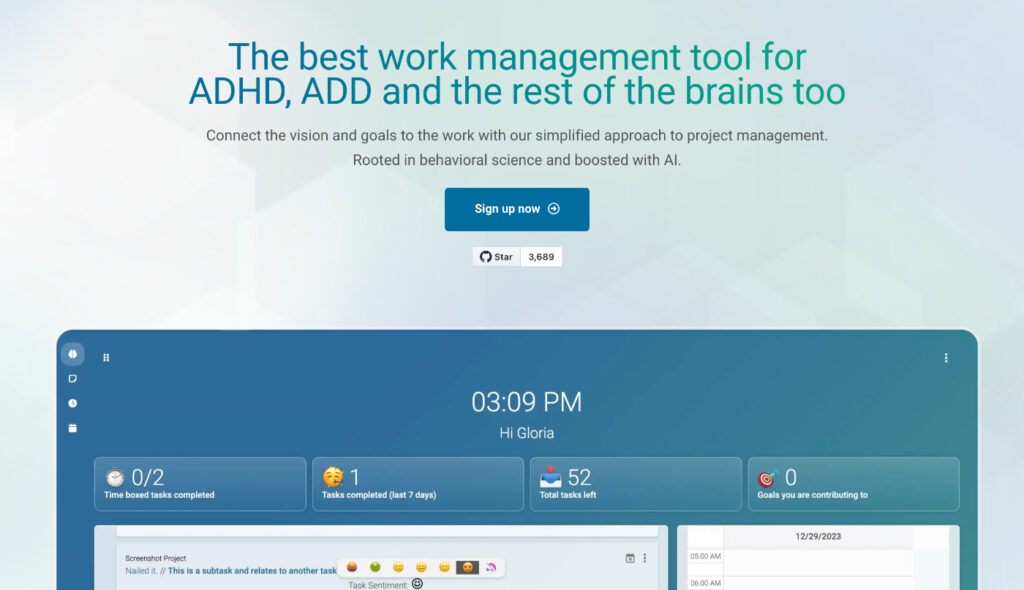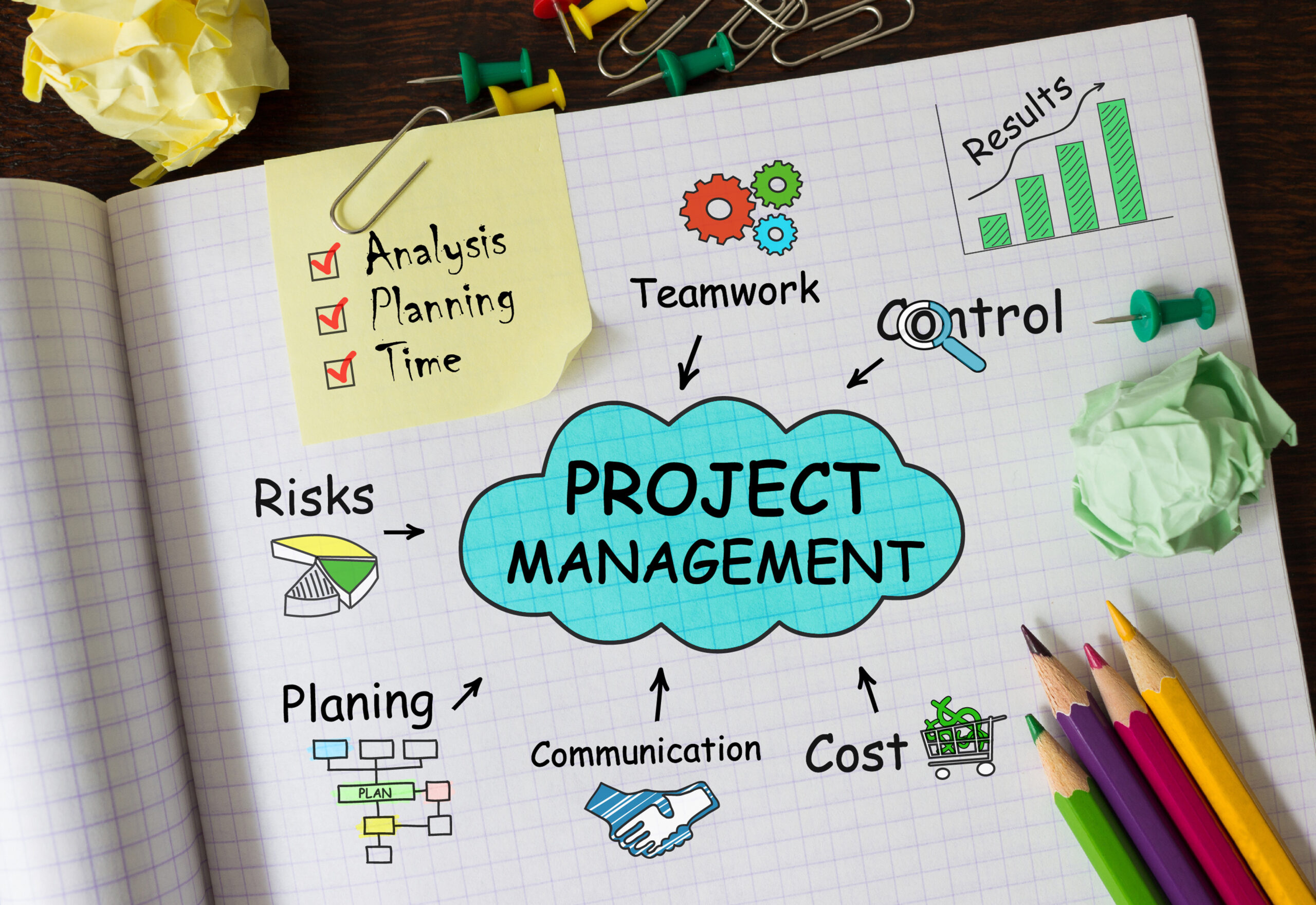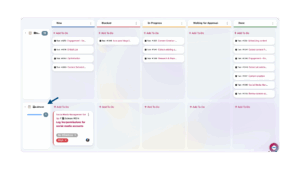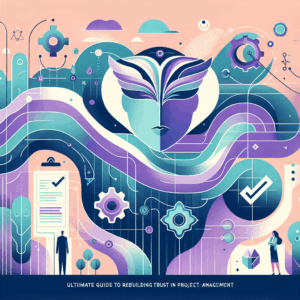Estimated reading time: 15 minutes
Attention-deficit/hyperactivity disorder (ADHD) is a neurodevelopmental condition that is often stigmatized as something that impacts our ability to pay attention, control impulses, and regulate our behavior.
I say ‘our’ because I also have ADHD. Now, while ADHD poses unique challenges in various aspects of life, including work, you should never call out the challenges without considering the distinct strengths that can be invaluable in many roles.
One such role that may seem counterintuitive at first glance is project management. In this article, we will explore how ADHD can both present challenges and offer advantages in the realm of project management and how individuals with ADHD can effectively navigate and excel in this field.
Table of contents
ADHD Symptoms
To effectively manage ADHD as an adult, it’s crucial to recognize its common symptoms.
Here’s a breakdown:
Inattention Symptoms
- • Struggling to maintain focus on important tasks or activities
- • Prone to making careless mistakes at work
- • Difficulty with task organization
- • Avoiding mentally demanding tasks
- • Misplacing items like phones or keys
- • Easily distracted
- • Forgetting daily routines
Hyperactivity Symptoms
- • Restlessness, like fidgeting or difficulty staying seated
- • Excessive movement in inappropriate situations
- • Challenges in engaging quietly in activities
- • Constantly feeling overly active or talkative
Impulsivity Symptoms
- • Answering questions prematurely
- • Impatience in waiting turns
- • Interrupting others in conversations or activities
Challenges for ADHD in Project Management
Attention deficit hyperactivity disorder (ADHD) is often linked with difficulties in paying attention, completing tasks, and staying still or focused. These challenges can make it tough for adults to succeed in any job, but this article will specifically discuss the hurdles of working as a project manager with ADHD.
Some common obstacles include:
Attention Difficulties
Individuals with ADHD may struggle to maintain focus, particularly in environments filled with multiple sources of stimuli. This challenge can be more pronounced in situations where there is a lot to process, potentially leading to increased distractibility.
This can lead to missed deadlines, overlooked details, and reduced productivity. And yet… all these things are required for many jobs and even more as a project manager.
It’s important to find ways to create focus in any role that you may find yourself in. A lack of focus can lead to negative reviews, missed promotions, and missed opportunities.
Taking frequent breaks may improve overall attention and focus, even though it may seem counterintuitive.

Time Management
Project management is a task that requires not only excellent organizational skills but also impeccable time management abilities.
However, people with ADHD may face significant challenges when it comes to time perception. This can make it challenging for project managers to estimate project durations and allocate resources accurately.
As a result, it is important to find ways to support individuals with ADHD in managing projects effectively. This could involve working with them to develop strategies that help them stay on track and manage their time more efficiently.
Related Blog: Mastering Time Management with the Pomodoro Technique
Staying organized is a priority. Providing project management software can help them stay focused. Encouraging open communication and feedback is also important, allowing people with ADHD to express their needs and concerns.
By taking these steps, we can ensure that individuals with ADHD are fully supported in their project management tasks, allowing them to be more productive and successful in their work. We’ll talk a little more about ways to support this further below.
Organization
Efficient organization is vital in project management. For people with ADHD, structuring tasks, prioritizing activities, and maintaining a systematic approach can be more challenging.
These difficulties may lead to disorganized workflows and increased stress. ADHD can impact the ability to focus on task sequencing, adhere to timelines, and manage the complexities of multiple tasks simultaneously.
This often results in a need for more effort to keep projects on track and can affect overall project efficiency and success.
One thing that I tend to repeat frequently is that due to our difficulties with organization and executive function, we tend to excel at discovering innovative and effective methods to accomplish larger tasks.
This out-of-the-box approach to organization often allows us to see certain things that others may not and can really end up being a positive rather than a hindrance in project management.
Plan and Adapt
Effectively managing ADHD in project management involves flexible planning and adapting as the project progresses. Instead of strictly adhering to deadlines, consider viewing them as guidelines. This approach can significantly reduce stress and prevent burnout, providing a sense of reassurance and control.
Allow yourself to openly communicate with your team about your working style and any accommodations you need so they understand your approach. Design schedules that fit your unique needs, allowing room for breaks or changes in focus. This approach not only supports your well-being but also keeps the team aligned and productive.
Stress Management
Individuals with Attention-Deficit Hyperactivity Disorder (ADHD) often find themselves prone to experiencing elevated levels of stress when dealing with demanding conditions. This susceptibility can arise from various factors, including difficulties in managing multiple tasks, coping with rapid changes, or facing tight deadlines.
The impact of stress on such individuals can be detrimental, as it can further impair cognitive functions such as concentration and decision-making, which ADHD already challenges.
Therefore, effectively managing stress is crucial for maintaining overall well-being and work performance. It is recommended that individuals with ADHD develop personalized strategies to cope with stress, such as practicing relaxation techniques, breaking down tasks into smaller, manageable steps, and prioritizing tasks based on importance and urgency.
By implementing such strategies, individuals can better manage their stress levels, improve their mental and physical health, and enhance their productivity and performance.

Embracing ADHD in Project Management
Attention-deficit/hyperactivity disorder (ADHD) is a neurodevelopmental disorder that affects a person’s ability to pay attention, control impulsive behaviors, and regulate their emotions.
While ADHD can present particular challenges, it’s important to recognize that people with ADHD also possess distinctive abilities that can be leveraged to their advantage.
For instance, people with ADHD often exhibit high levels of creativity, flexibility, and adaptability. They can often think outside the box and develop innovative solutions to complex problems.
Additionally, their hyper-focus on interesting tasks can allow them to complete projects with a level of intensity and thoroughness that is difficult for others to match.
By acknowledging and utilizing these strengths, people with Attention Deficit Hyperactivity Disorder can succeed personally and professionally. Here are some of the advantages:
Dynamic Problem Solving
Individuals with Attention Deficit Hyperactivity Disorder (ADHD) have a unique way of approaching problems. They tend to think outside the box and come up with unconventional solutions that might not be immediately apparent to others.
This is because their hyperactive minds constantly generate new ideas and possibilities, allowing them to adapt quickly to rapidly changing circumstances.
These traits make them well-suited for product management, as the field often involves navigating unpredictable situations and finding creative solutions to complex problems. In brainstorming sessions, ADHD individuals can provide a valuable perspective by offering a multitude of ideas and potential tactics.
Their willingness to take risks and experiment can also drive product development in exciting new directions, leading to innovative solutions that might not have been considered otherwise.
Overall, the unique strengths of ADHD individuals can be a tremendous asset in the field of product management, and companies that recognize and leverage these strengths can reap the benefits of a more dynamic, creative, and forward-thinking product development process.
Hyperfocus
Despite difficulties with attention span, people with ADHD often experience episodes of hyperfocus —an intense state of concentration on a desired endeavor and task.
Yet, despite these difficulties, they may also experience episodes of hyperfocus, where they become deeply absorbed in a specific activity or task. During these times of hyperfocus, individuals with Attention Deficit Hyperactivity Disorder can achieve exceptional productivity and produce high-quality work.
This intense state of concentration allows them to tune out distractions and focus solely on the task at hand, leading to a level of productivity that may be difficult to achieve otherwise.
Harnessing the power of hyperfocus can thus be an effective way for individuals with ADHD to overcome their attention challenges and achieve their goals.
Multitasking
Though often seen as a detriment because it limits our productivity and can be a distraction, the ability to juggle multiple tasks simultaneously can be advantageous for the person with ADHD.
Studies often show that people lose a significant amount of time when they engage in multitasking. Those studies, however, do not typically differentiate between individuals with or without ADHD — where multi-tasking can be a source of dopamine.
In such an instance, individuals with ADHD may excel at handling complex projects with several moving parts, often switching between tasks with relative ease.
Out-of-the-Box Thinking
Individuals with Attention Deficit Hyperactivity Disorder often possess a unique set of skills that foster creativity and divergent thinking. These qualities enable project managers to generate unique solutions and identify innovative approaches to problem-solving.
It is well-known that individuals with ADHD have a tendency to think outside the box, and this ability can lead to more effective and efficient project outcomes.
Moreover, individuals with ADHD often have to create unique and exciting ways to function in a world that is not built for their brains. This requires them to think creatively and come up with solutions that work for them.
This skill set can be incredibly valuable in a project management role, as it allows project managers to see problems from a new perspective and develop creative solutions to complex issues.
Therefore, it is important to recognize the value that individuals with ADHD bring to the workplace. By promoting an inclusive and supportive environment, we can enable these individuals to thrive and contribute their unique perspectives and skills to the organization’s success.
How to Stay Successful in Project Management with ADHD
ADHD symptoms can present several challenges for project managers, including difficulty with organization, time management, and focus. However, with the right strategies in place, individuals with ADHD can not only manage their symptoms but also thrive in their project management roles. Take a look at the examples below:
You Should Capitalize on Hyperfocus
Recognize and harness the power of hyperfocus by strategically aligning tasks with your areas of interest. This tool is particularly helpful and useful for managers to recognize (and applies to employees without ADHD).
Working on something that interests you, that you excel at, and that you can bring impact by working on… that’s what results in an engaged employee. If your manager isn’t seeing your strengths and helping to put you in work situations that harness them, then the organization is doing your skill set a disservice.
Either way, it’s really important that you take the time to identify your strengths and the things that turn on your conquer-the-world mode and allow you to ride the dopamine wave.
Develop Effective Time Management Techniques
This may be stating the obvious as you are at a point where you are either:
1. Considering project management as a career. 2. Already in the business world. For you to get there, you’ve had to have some time management tricks, but let’s touch on some others.
Our phones make for great personal reminders and timers. Setting reminders and harnessing those features can be great at making sure you get things done on time. I find I’m often always running a few minutes behind, so setting calendar reminders and timer alerts can help ensure I’m not involved in something that I won’t be able to get my brain out of.
In the actual work, consider breaking the work down into achievable milestones. The smaller we break down the work, the more manageable to-do lists can become. There’s a limit to this, though, as you will have to find the balance between smaller tasks and being “overwhelmed by all the small tasks to-do lists.”
Always set deadlines. One of the hardest things for us to keep track of is an ambiguous deadline that may or may not ever happen. Many of us naturally use deadlines as a way to crash into some dopamine (putting everything off until the last minute).
Related Blog: Individuals With ADHD: Tips and Tricks for When You Really Don’t Want to Do Work
Leverage Project Management Tools for ADHD
One of the reasons I’m even here writing this article is because I could not find technology that thought of my brain when it came to organizing my work project management. Project management tools like Asana, Jira, and even apps such as Clickup and Notion often became too overwhelming for me to use.
Why were some of the management tools so overwhelming? Well, often, it was because of the work I had to do (on top of all the other work) to think about how to customize and set up my projects. I wasn’t really managing my work — if I could get it set up, I was managing the system.
So here’s Leantime — where we’re building the right tools for ADHD and other neurodivergent conditions. Finding the right tool that builds with you in mind allows you to be better at what you do best, facilitate collaboration and task distribution, and maintain visibility.
Take a look at some of the best project management ADHD tools.

Leantime: Features to Support a Variety of Minds
One of the things unique to Leantime, when compared to other tools in the market, is that it focuses on work management for the neurodivergent population. That is, they build features with cognitive accessibility in mind for individuals with ADHD, ADD, Dyslexia and even Autism.
Up to 20% of the population has some form of neurodivergence, and if you’re a business owner, you’re even more likely to have either ADHD, Dyslexia or otherwise. Neurodivergent minds may have challenges with maintaining focus, managing loads of text, or even challenges with spatial awareness.
In the case of ADHD, in particular, if the material is too overwhelming and the interest level isn’t high enough, it can be harder for those users to engage in your work management system.
Leantime’s CEO was diagnosed with ADHD in 2021. She has had this exact experience with other tools that require her to customize, organize, and take hours to set up a smart workflow.
The best practices of project management don’t have to be complicated and that’s why they built in an established workflow of the best practices in Leantime. No more overwhelmed when you get in the tool.
Delegate and Collaborate
When working on things you enjoy, have a natural aptitude for, or can hyperfocus on, it’s important to recognize the areas where you may need assistance and delegate tasks accordingly.
As a project manager, you have the advantage of having a team at your disposal, which means that there is more room for delegation. However, you must be clear and direct with your team about your requirements. You need to identify where you require assistance and support and where your strengths lie.
Collaborative environments can provide valuable support, enhance accountability, create, and help manage project complexity effectively when managed well. Therefore, fostering a culture of open communication and trust within your team is imperative.
This will enable you to ensure that everyone is on the same page, working towards a common goal and that you can capitalize on each other’s strengths to deliver the best results.
Lean Into Structure
Creating and maintaining routines is crucial for me, especially in simple tasks like placing my keys in the same spot every day to ensure they don’t get lost. Developing rituals and structured routines helps in maintaining consistency in daily life.
For example, establishing a specific pattern for initiating difficult tasks can make starting them more manageable. Over time, this routine becomes a catalyst for engaging in challenging work. Consistently adhering to these work habits can foster stability, helping minimize distractions and streamline daily activities.
How ADHD Works in Favor of Managing Projects
ADHD presents unique challenges in the field of project management, but with the right tactics and mindset, it’s possible not only to overcome these hurdles but also to excel at work.
To succeed as project managers, people with ADHD should capitalize on their periods of hyperfocus, align tasks with their interests, and break down projects into manageable chunks.
Effective time management tools and techniques, including the use of calendars (for remembering appointments), sticky notes, and project management tools, can help them stay organized, meet deadlines, and avoid feeling overwhelmed.
Leveraging technology, other tools, such as project management software and automation tools, can streamline workflows, improve communication, and enhance overall project efficiency. Delegating tasks and collaborating with team members who possess complementary strengths can foster a productive and supportive work environment.
Lastly, fostering communication with colleagues and stakeholders about ADHD can help raise awareness and create an environment of understanding and support.
By sharing their unique perspectives and strengths, individuals with ADHD can contribute to more creative problem-solving, improved decision-making, project success and finish tasks.
Final Thought
While ADHD poses certain challenges in project management, it also includes distinct strengths that can be vital for success. By employing effective strategies, leveraging technology, embracing structure, and seeking support when needed, it’s possible to navigate the complexities of project management, overcome obstacles, and make significant contributions to the field.
With the right mindset and a supportive environment, project managers with ADHD can excel and drive exceptional results in their professional endeavors.
Yes, someone with ADHD can be a project manager. While ADHD can bring challenges like managing time or staying organized, it also offers strengths like creativity, energy, and problem-solving. With the right management tools and support, individuals with ADHD can succeed and even thrive as project managers.
ADHD can bring strengths like creativity, high energy, and strong problem-solving skills to project management. Individuals with ADHD often think outside the box, adapt quickly, and bring enthusiasm to projects, which can be valuable in fast-paced or dynamic environments.
Teams can support project managers with ADHD by providing clear communication, setting structured goals, and allowing flexibility in workflows. Offering tools for organization, regular feedback, and a supportive, understanding environment also helps them manage challenges.






